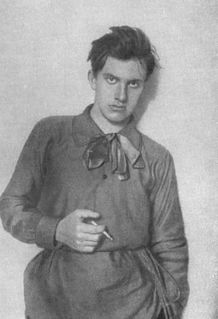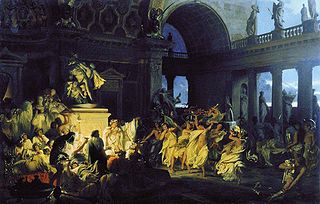External links
| This article about a book on political philosophy or theory is a stub. You can help Wikipedia by expanding it. |
The Philosophical Notebooks of Lenin were a series of summaries and commentaries on philosophical works by Lenin. Included were works by Aristotle, Hegel, Feuerbach, Marx, and Deborin [ citation needed ]. Lenin's notes on dialectics played an influential role in Soviet and Chinese studies on contradiction and the unity of opposites. The Notebooks are often contrasted by scholars with Lenin's Materialism and Empirio-criticism .
The proper interpretation of the notebooks would play a major role in the Mechanist debate of the 1920s in the USSR and the One Divides Into Two controversy of 1964 in China.
| This article about a book on political philosophy or theory is a stub. You can help Wikipedia by expanding it. |

Leninism is the political theory for the establishment of the dictatorship of the proletariat, led by a revolutionary vanguard party, as the political prelude to the establishment of socialism. The function of the Leninist vanguard party is to provide the working classes with the political consciousness and revolutionary leadership necessary to depose capitalism in the Russian Empire (1721–1917). Leninist revolutionary leadership is based upon The Communist Manifesto (1848) identifying the communist party as "the most advanced and resolute section of the working class parties of every country; that section which pushes forward all others." As the vanguard party, the Bolsheviks viewed history through the theoretical framework of dialectical materialism, which sanctioned political commitment to the successful overthrow of capitalism, and then to instituting socialism; and, as the revolutionary national government, to realize the socio-economic transition by all means.
Marxism–Leninism is a political philosophy that seeks to establish a socialist state to develop further into socialism and eventually communism, a classless social system with common ownership of the means of production and with full social and economic equality of all members of society. Marxist–Leninists espouse a wide array of views depending on their understanding of orthodox Marxism and Leninism, but they generally support the idea of a vanguard party, a communist party-led state, state-dominance over the economy, internationalism and opposition to capitalism, fascism, imperialism and liberal democracy. As an ideology, it was developed by Joseph Stalin in the late 1920s based on his understanding and synthesis of both orthodox Marxism and Leninism. It was the official state ideology of the Soviet Union and the other ruling parties making up the Eastern Bloc as well as the political parties of the Communist International after Bolshevisation. Today, Marxism–Leninism is the ideology of Stalinist and Maoist political parties around the world and remains the official ideology of the ruling parties of China, Cuba, Laos and Vietnam.
Maoism, or Mao Zedong Thought, is a variety of Marxism–Leninism that Mao Zedong developed for realising a socialist revolution in the agricultural, pre-industrial society of the Republic of China and later the People's Republic of China. The philosophical difference between Maoism and Marxism–Leninism is that the peasantry are the revolutionary vanguard in pre-industrial societies rather than the proletariat. This updating and adaptation of Marxism–Leninism to Chinese conditions in which revolutionary praxis is primary and ideological orthodoxy is secondary represents urban Marxism–Leninism adapted to pre-industrial China. The claim that Mao Zedong had adapted Marxism–Leninism to Chinese conditions evolved into the idea that he had updated it in a fundamental way applying to the world as a whole.

Vladimir Vladimirovich Mayakovsky was a Soviet poet, playwright, artist, and actor.

The word decadence, which at first meant simply "decline" in an abstract sense, is now most often used to refer to a perceived decay in standards, morals, dignity, religious faith, honor, discipline, or skill at governing among the members of the elite of a very large social structure, such as an empire or nation state. By extension, it may refer to a decline in art, literature, science, technology, and work ethics, or to self-indulgent behavior.
Philosophy in the Soviet Union was officially confined to Marxist–Leninist thinking, which theoretically was the basis of objective and ultimate philosophical truth. During the 1920s and 1930s, other tendencies of Russian thought were repressed. Joseph Stalin enacted a decree in 1931 identifying dialectical materialism with Marxism–Leninism, making it the official philosophy which would be enforced in all Communist states and, through the Comintern, in most Communist parties. Following the traditional use in the Second International, opponents would be labeled as "revisionists".
A partisan is a committed member of a political party or army. In multi-party systems, the term is used for politicians who strongly support their party's policies and are reluctant to compromise with their political opponents. A political partisan is not to be confused with a military partisan.

Materialism and Empirio-criticism is a philosophical work by Vladimir Lenin, published in 1909. It was an obligatory subject of study in all institutions of higher education in the Soviet Union, as a seminal work of dialectical materialism, a part of the curriculum called "Marxist–Leninist Philosophy". Lenin argued that human perceptions correctly and accurately reflect the objective external world.
Communism is a philosophical, social, political, economic ideology and movement whose ultimate goal is the establishment of a communist society, namely a socioeconomic order structured upon the ideas of common ownership of the means of production and the absence of social classes, money and the state.

Rentier capitalism is a term currently used to describe the belief in economic practices of monopolization of access to any kind of property, and gaining significant amounts of profit without contribution to society. The origins of the term are unclear; it is often said to be used in Marxism, yet the very combination of words rentier and capitalism was never used by Karl Marx himself.
The One Divides into Two controversy (一分为二) was an ideological debate about the nature of contradiction that took place in China in 1964. The concept originated in Lenin's Philosophical Notebooks. The philosopher Yang Xianzhen, originated the idea of "Two Unites into One", which he said was the primary law of dialectics. The Maoists interpreted this to mean that capitalism could be united with socialism. Ai Siqi wrote the original attack on Yang, and was joined by Mao himself. Wang Ruoshui also contributed to the attack. After 1976, Yang was rehabilitated as well as the concept of two uniting into one.

The Prison Notebooks were a series of essays written by the Italian Marxist Antonio Gramsci. Gramsci was imprisoned by the Italian Fascist regime in 1926. The notebooks were written between 1929 and 1935, when Gramsci was released from prison on grounds of ill-health. His friend, Piero Sraffa, had supplied the writing implements and notebooks. Gramsci died in April 1937.
Dialectical and Historical Materialism, by Joseph Stalin, is a central text within Soviet political theory Marxism–Leninism.

Marxism is a method of socioeconomic analysis that frames capitalism through a paradigm of exploitation, analyzes class relations and social conflict using a materialist interpretation of historical development and takes a dialectical view of social transformation. Marxism uses a materialist methodology, now known as historical materialism, to analyze and critique the development of class society and especially of capitalism as well as the role of class struggles in systemic economic, social and political change.

Georgi Valentinovich Plekhanov was a Russian revolutionary, philosopher and a Marxist theoretician. He was a founder of the social-democratic movement in Russia and was one of the first Russians to identify himself as "Marxist". Facing political persecution, Plekhanov emigrated to Switzerland in 1880, where he continued in his political activity attempting to overthrow the Tsarist regime in Russia.

In Marxist philosophy, the dictatorship of the proletariat is a state of affairs in which the working class hold political power. Proletarian dictatorship is the intermediate stage between a capitalist economy and a communist economy, whereby the government nationalises ownership of the means of production from private to collective ownership.
In the context of the theory of Leninist revolutionary struggle, vanguardism is a strategy whereby the most class-conscious and politically advanced sections of the proletariat or working class, described as the revolutionary vanguard, form organisations in order to draw larger sections of the working class towards revolutionary politics and serve as manifestations of proletarian political power against its class enemies.

Dialectical materialism is a philosophy of science and nature developed in Europe and based on the writings of Karl Marx and Friedrich Engels. Marxist dialectics emphasizes the importance of real-world conditions, in terms of class, labor, and socioeconomic interactions. This is in contrast to the Hegelian dialectic, which emphasized the idealist observation that human experience is dependent on the mind's perceptions. Marx supposed that these material conditions contained contradictions which seek resolution in new forms of social organization.
Vladimir Ilyich Ulyanov was a Russian communist revolutionary, politician, and political theorist. He served as head of government of the Russian Soviet Federative Socialist Republic from 1917, and of the Soviet Union from 1922 until his death. Based in Marxism, his political theories are known as Leninism.
Self-criticism is a philosophical and political concept developed within the ideology of Marxism–Leninism, Stalinism, and Maoism. According to David Priestland, the concept of "criticism and self-criticism" developed within the Stalinist period of the Soviet Union as a way to publicly interrogate intellectuals who were suspected of possessing counter-revolutionary positions. The concept would play a major component of the political philosophy of Chinese Marxist leader Mao Zedong.